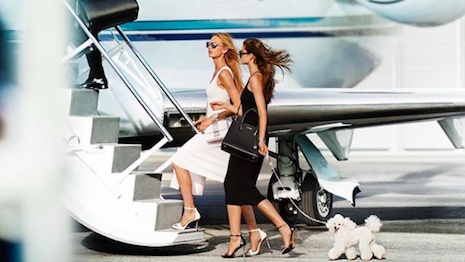Building a strong connection with the affluent segment on a one-on-one basis for brands could potentially help consumers overlook other issues.
According to an Altiant report on the sentiments of affluents and high-net-worth individuals, luxury hospitality is drawing in well-off consumers and could alter the high-end travel industry as a whole. The sector saw the highest performance in terms of sentiment from survey takers, while wealth management saw the worst metrics.
“When looking at the six sentiments, it appeared that emotional connection had a positive halo effect, making us wonder if building a strong emotional connection with the wealthy customer could compensate for other weak attributes, such as trust, ethical/social responsibility, value for money, etc.,” said Meryam Schneider, vice president of marketing and partnerships at Altiant. “For instance, the luxury automotive industry scores the highest in emotional connection in North America and APAC despite a low level of trust and ethical/social responsibility.
“Similarly, premium air travel scored high in emotional connection and was pretty lackluster in terms of value for money,” she said. “I would have expected a more positive correlation between these attributes.
‘This was so surprising that we will be conducting further research on the correlation between emotional connection and customer behaviors in the luxury field.”
Affluents and sentiment
Following hospitality, automotive, air travel, soft travel and hard luxury fill out the top five spots for rankings in consumer preference.
Wealth management remained at the bottom of these rankings due to customer service, lack of innovation, trust and ethical responsibility.
Affluent consumers in the survey referenced brand such as British Airways, Hilton, Rolex, Audi, Mercedes-Benz, Apple, BMW and Singapore Airlines.
However, brands such as Tesla, Emirates, Samsung, Audi, Apple and Mercedes-Benz were the most cited brands for being best in class, in no particular order.
While factors such as customer service and trustworthiness have helped push affluents towards brands and industries, many are lacking in terms of social responsibility.
“A less surprising but notable point is the poor proportion of five-star ratings on ethical/social responsibility across industries,” Ms. Schneider said. “[This is] a clear message that the luxury market could do more and maybe lead the change on these matters.”
For innovation aspects, electronics are driving favorability worldwide, as is the luxury automotive sector.
Hospitality is known as the top performer for trustworthiness, followed by air travel, soft luxury, automotive, hard luxury, electronics and wealth management, in order.
Additional insight
Despite perceived cultural differences, affluent consumers in the United Kingdom and China have habits and attitudes toward luxury that are increasingly similar.
Per Red Carpet Research’s “Affluent fashion trends: U.K. vs. China” infographic, consumers in both countries purchase luxury in much the same way and have an interest in the same high-end brands. While notable differences do remain, it is beneficial for luxury brands to understand the shared sentiments that exist between two of the world’s largest luxury markets (see story).
In a time when social media allows customers to voice their criticisms of brands' decisions at any time, navigating through those crises becomes easier while bringing on new challenges.
Speaking at Forrester’s Consumer Marketing event on Apr. 6, an analyst from the research firm explained how Forrester views brand crises, how they can be predicted and how to handle them once they arise. By way of example, she brought up how Facebook’s recent controversies involving Cambridge Analytica have affected its users' opinion of the platform (see story).
A more specific takeaway is, for example, the strong position of the high-end hospitality industry, defined as five-star luxury hotels and resorts for leisure.
"Despite a low rating on innovation, the industry scores in the top two positions for customer service, trustworthiness, ethical/social responsibility and value for money," Ms. Schneider said. "The position of this industry is robust in the three regions: Europe, North America and APAC.
"We believe that luxury hospitality could be setting new trends for the global luxury industry," she said. "As demonstrated frequently, the pursuit of luxury experiences over possessions has been a global trend, which explains the solid growth of luxury travel in the past and a strong predicted growth for the next 10 years.
"The nomadic and global nature of millennials is also reinforcing this trend."
{"ct":"vXs70z7IhHsURhIQ3By6hQVrrBRfTO9ROVr5AkXXK0\/qDME619KFnN4p+eKNwUoSR54GxElxxvaS0cOmmZ2cKuy+zig7cZ9Bqql5c2LQ0RGwaStD2WD1SHVLgCJEqCk9bFBj9nKDtiK9MC9pbRLnVNO9mN0VeX6sE0idPwBK7vaO6\/cGnrvrAMjZ4mUIGLUzg4CAXFMywWQi7pCePdP3OGR+aE1KzIFv3mrkqsnHhVPJ32PuRS5Tuc0mXRwdf4FZJGCn+UmZEtUBJsl90Dh4IK8yEXR2EqPGiPo9VXZyfIskk3AsDMwF2elwJ6eNNoRPuO4wpTQr6QO+o7Ug+X74FFLTGhlQgUQBtgjY9GxW7F3StwQAfzvh19IFr5Iu73nbVJIhGIUi\/4oYoAQoyIJ+T\/mbSZoB8b7GcOucqb+5FcP+hKQfq8QKgfbLlQXbU8U\/3vzDOAOE\/Nk33rcB6uSPWysMnoTBvxyYu9hsQXaYeVjKdMLbMjqNZEKrWPvFL+rGs14vcNdHPxd52NT2mlxNurT2apiBpnhqQYkoEupwfVqmORDcGp170grfERw2f59vX9+wJe4WWcfarw2HKvdNlfhgF+cFopU2ycqWKLxxFV8pHr2Hk2oTvpvG5ZvxR74wnMpemE5MfTKSnaeLN31srWYGKQ4AOLU6zj4uDcIjy56\/cwFyH9J3TceLYh\/ETUuWLOBfg1uIInbVjneGAKa\/CBx0Q9G7Ecpljlc66hWKriTOTIMJUabiGMPnXCeeKOHQ7nUVJS1SVTaScbuX8Ju0QkpEVp+9AdNqweaR0cKCRVGYh\/z7zlLypDFyyc4oIrusDwIDhnCTRVHIVTb6Q64LL6kOePbbR102ow3FXM7NN8e0dwlywOgtoPBoRy3qeoYZQZA7ItZVh2ivP2ID9xwvQaan5oPG6X31Gc74ccZV7nTpFjMONMBTln\/wZ0pk9\/o4W6THUHFf+vu74NjRxaQkyK0lCvKBCnwgTKPyh3JYs5uNEgE0egnXClVzEIa0HGk+BAGqz4ffLJY5QVZMEzFv5CiCWFsbWgw7C7WWTxQL7psh94T+Hd8VZ1sedGU5feuzaePNRKuFiocc3euRmK\/kjeeZJ\/EXZA2kShgdpGKNEQw3HHiMahBzncV6eKyfWjp\/82+ZerabtDpeAsmd\/RUIxwNBDaJ4LX+5SecSIrrQ0+x0V2JpKWTWs4EiXhRVckS6kgd5Xe\/Tg8dh23IWBOYMvaMwLp\/MWTAIzlz5YtQDuw15kRPKIPdSImZkYoLkYeKzRgrogXSQx0jaeFT3Gof9lXPMwFPP27gTxf7K7oW0QGjUBpEa+tjhuDzNxrU6GgDCAPgVLkRqdiZc3eJTdUGXuvwrMbRbadksXOtjDWSFvCSMZM7Kl7mvNdeXEJbWvnL6gol2wqU2vRK4D8VZiLFiRKoJcA+7LUTsOo0E9NyQijoD0VnzN7xf\/8xo706S9lWQVuQiS42h\/wN5g1xP1uXoz+XtHTYPzDYitxKRmbcDxDJdu4dhH9Y30j6aTmdCBVrX9TQMRJlyh1yzOsOfLdffyV1K25PqLk+7ilvYX+VFYV2IhbeKq7xwHlR\/St\/dAAndz5nHYq3th6ezrrgR9XJfB08dPM1DhTw7+eMcTQZmRQFs0Sa+biWR3Z7PPnnZ9vrVraQFQ7sNMZ4UUsxnxALYHASXdbO5FIavya9fqAegCQyARXBzJ3qnTy6wzrCvFuEyAFN2B5GIAmJLTq7lyX9PaVbpvTLuw3WeU\/MEzoTjFgsYHRkkmFn4kPXj51pD1aklf9f\/mTUZnBGFXdx0XYrUZ1vVe0CbF1143QUkaeu9QlI3S4QV4NlfAna3qxVAt4SkiMYwxxhREgNXJun6yI0PATQnJyJb3ozn6V8vW8gc0mXBYRVGRWJi7RKNm9Q9FXeiBfagSJDFEA4Ppe9ucB\/YEu6GY1hJ3MktkR+8bPjpBaKUctJbBJ\/FmmSdHKF3ssHS2N844RKT7+2XEF5+ZxLSm2yQy80ORxiySCfKhse0WkFkoqD+ngGWmoxUq09WHDhZ0XKQsUaRrlDwcsJ\/wp4mg\/ZbqHvyLgbDIDdmRpfVhGmQ0AzhYUUYJB7j2ttSSCQ8+Ge7ZttQqLMz26MJQfLIWF6GnfwKoNXjH31fMP8nSn2+WTrDaiOZlXuJ1BNEuL6WKIKLt0KL3uVKZ\/splVWExguejIscts9E1O+GerL6hoQxZdi40tXTwrSF3c\/Zl4HaAYm96N7tRKPy2c+6uIt+L4JVkXYJ6fG1STD\/w7QQDPrHby5GnoIQ\/bHeY2GOiGAcy8lFb+AhJP4yh0q+49MI50WoTuPIHpNC1fcmR1IhrGPIolaFKuTqVaSfU3syFVQEjJh\/zLy4yGAD3USoq10wKZqL1\/MLfn0feUea1scqVcDVGAQAGfXEmao20YZ6xKw03KgJXyZg7+buLagZmnb7L\/USqO+mWXnA2N5vPKDwNu2qA017wgPOsDnZZfbTQYegV7DEZ15m5wHOPVmOGBH0GtStROlncZfOdp54JtLp3HolVPD\/zJDmM9y3E5nyrEkGBIiGTiWAwAB2wfMW3\/6o0UTzd70Tjo7hoaTK\/BJaCneucVy6\/mhwV8gLk\/Hhixic2ZRKIdR+eqWM9IzJb883Pt30qVnR+AbwbeYfjoNZ+kO+UlGwGS73QwvY69Eax+4YkwZp8c76L+DQBREOScoTGDZJablrHEWHCyeDhT\/1DjMgcgkH5zi9e3kFWvLMIX8ILfBy\/Y3FhRdWXZCj8jPXY9mVeosUnygSRk4JJb+MHz6HYukFwtDICdkNZKKqEE0fO4eCpYCWr\/KmdvNYhu7mX0um8hXQdXTn7qxnfAwKEUG9ReyfYnh2ZOtKEj5TVpHG3zNW1jjFuf\/LEpoMw7i+cRmtCzi\/UMR8TBUGc48e2Of\/\/6CzBP+qfcA08ozQTJkDenQmtY3Pz1dDExFyH\/y5gknThDGe5zKjdUbdaIYDg0pAweH0w+vSUZ\/Sy4vHyWUT73tWqvRS1tvRCForI4+FI2epfm33\/O\/ka9xUbobTk9kmKo2cy2rZRQRiIThY\/FQfQQ3vZWDSXBtcHJazp9RZcm3KEavfjwzWKCSSN8Xnb+jhNMy0qR\/qUAbx4MJo62ez4QNa+lJA9s60bIxXwy3klLFAlwf6xDN9Ea5SLGx7D4nxIYV35WP6r1w\/joFmtUUNfz2PCmk8rnz4MSJqtIl3D8ZppfjfnW4Fhfoh5HmlblAG24dJ1Oor9I\/OcqqXSk2T5qpNHMoAdikDQjNZ9hTERUPVRMFjaLZU4pI4nmws8p8WtfFS08BCYLgD0bvFRO6\/1ep3nswuREFsm9PnEsU\/juzmPjit74wvC2d7fkU3+nKO8kf++POJ9EE4zdPDioDjk1AQ9AaWcDZeLqVUqXtqRKW8id49FMuJU8BTOZlmUBdhXxMgfhXmbE8wIWkV0cNurDINaHyU4iVpQS7JofILTq12GsO5GOj13EFAiNEkGmPtk9WAbq6BTFn0iNorZPcmH5m3B5O+SjJMx8icSVUvP0Ob+STUytgG3CZKXamHQ9q3xjTxVlsuVYOgVIt6VCNrc6NQtJFW9ADSDrfoWqtDX5AKs9oPGo48u6ISCvczLwMD3SxM1ASvRVhkES8MAZnbot8a8vwiLYCjAUC5BAovFSu0Cwk19aYtzMQiYZdCsmKINJp17tgFCoZiyJpOWHOnrLBKT3KrR0AXNSjmKc1u1AG+AY1Yi99Fwp4Zwo6SStCx5DkpR3UMEPdfiI+ylcQQFRs71sUX8tcHUxQtGmUcfHATc1x\/dEjUdLlsOc+1GpZwVWpsqFGm0j+\/CavwITGZvWDEpP2zQG2Ap+FZxDBK1V25t8uu0yHbGHMmmLqSVZxgtTdUhAT3JHVOD7NmRjl0n3u\/nu6+\/1+So5cjW\/RqXr0NPSkcqcghHu79K5MiBgZMqFka2RnSSfCojExuF4TEI8BCrJKvbpGnUKxtRkhCZ4hiiRmhn\/dbNqO6gYfPwSoARhvj9fh0J\/XCX6ycfhTRmUfhZRI4pRH8TGUB52YXBHRksmb6N8QDo0y660n6op+9cQQ9RGjEiNCCsqnja22EGCsKEzQB2pYwEyK2d2r46msLKZpWyvo2JyzEsi0HKJorI91xi6PmUxZIWDMkRT3OrFsSFIcD7j\/hOcqv3deNZaoWv6y0mMlgJ8vzViFGAVXUYkXcxsxZ6mhzX470OZ6qffxJwMRLFtv3QZz9CfG4qZ8QCMab8M9VZ7tzu2F+QrIoECjNIMORwU5oySTErNclKQjXRQZPXxnOIGBZGq3WUmCoPUja9ZXYPxZcJrcC1pj47\/E\/AhQydjae7G927\/BKxq6yqZW02LGKifEmPNtWE9s6hoepL3Hfde6Qa6bN++m7jpuJqynokIWCVkJ8sNU2nWMQ3oettx6dVP4zseFEbPcTloJNDJdukhBxIWQKhPXEwWfQ4fR6GUnylr2EqzKyX8Pc6sVTmM3pJ0UkoMmEl3cz5TMoJRJFqBW4eUmry+7+Klpr0ErS9qMkixjkxE3rx5jFDaGSLuH5MWX0mBe5+uIumTSRJTFf5gSCKtSASIlTaALcXvC9WFSFbZ+dCbFDUIhZ8Bll8Isi\/P7p08nq\/YRY9jlXneviUkbt\/G+smuL5MnFv6nBDqn2hcQd1nyKeunJpLrHT\/+vgn9kG+Wp+KDOeu2D5DSFsT2QBv8Lf3tcf3OPlJN+rPmCNUPk+DZ6n4qmW3\/oRnSxUwtNmP\/T1a4RRu6rFGqjvEN4PLY8t083\/ism2xJo0oWkH\/4VOlV34FzQPl1lyuFcKOzq0yH6ih4YiA57N1AABTxu+7ftWMGt0hxn3p8SBpybPSRrYYm8czbTMIi9FbKXreZMh4tO22Fb+QCAvdu9\/yOLNTuL9IwmcZhorEMMTpgzeBcVxoAgcWF+zSbU6hn+6FtDXGh7bNmSmqc5B9IpCYIjX15OTNpuwp4GE8zzaHx8FlrAgSjHvoh2qhPtpolVjyNS4fQq6pn1p76BUcHuPil\/pdrIA55f7oETUMHsOga\/I\/tHBU2cpYzkhJguHADYpSqjKCgbCJbGKfQjktxsDokbhL\/4OgK5ONTwT386meEJfRwgLJSDTkHjVfYa2BweksV+7Lfc7AivP18ACKIe2WZufHvWJI\/gPYMfW9ZVy2DUgnRmN7CrhHT1B+W0xrQtUo2+fYSM0M4acW2SEvz71Ms\/ZO3vZVJ8dmg8+TGt3\/au1egfBxrDy2j4Q6JLVCmDW8q9bhfoIAL+gbztV8ltE\/4ukJuRdr7Ix8a7CWHPAq7pKpv81mOA7sJX91S6+4g58c8ORUFyo\/Ed9RtZHmVJISFQ\/sfDPad+zXYw3r\/KayoyOngJ5PI8PnkLZejo0tKvrYPMYBC5N2IdLESWqaH5I8oCY20Aj9TKl0pJz2OrwkNa41tlV1rXEXAVyCj9xhhYRUY81oI0Rchb45zLtcSdl8BLd0Buq8Wb93pT\/M1m7fHBvQIBjlsAYmB4\/twzmqtAHLYlDe0zxbDfJFY+9eHuRUrytKDgCnYuJ3LlKEAMzLvSqdi4MBUQy6nDcnXrU6309drvE+m7lXh6iMEDoqxW0p63btddm58q2W1p0JiXg6GRn8lyOgdcP6EYjDb\/hHrh4xjoRCuO\/ExZ5bM6E0Wvw\/QiMosj14V8cunzGeBfur6EtoJN18P\/AeFrAK0w1WxRtSo\/fQsPph6r0esTYqCzyn+eLWjT0nxJwE5M4CtUQCeKGBbXW5WMezIZe9k6VWHeWfAcJqrW3vKK1lBuOJsMOt2lHrhEtnWD6sY723iwgp4fKyX5dX96DsIZ3\/i2FnrTD6dggNy4HRNmgKkTuSuC9b1q8a4NGxtSop5pWdta33tDIVsKleVa6bDP\/CYqsF4imMY8y7tZ8rUTAp6oght5ivgRHoi0iK2VEtaVd2h5s\/zZeasEIO\/6klP7BXBw6DAm\/V3CmCjio6SR3cqOqS3PQUF8vq03NQuS+IngS8qUbUV\/VEs0wvN93LdInn4\/55PfbXsr7Xt5iGkEpo8F1bZuKK6XGi\/kKsXLEhiqgUYwzahsQcvQ8znInZFUfLfEgf4wWaY5frq1M3q7l2tzCN6GXnpUbZ2rJCKtMu+QR+VEmsPPJPgjIuTUOeojJQzdL1gkmuWgEO2KUBKHVF4FVTJN+Tr2DsClngjcujO7+R9p9CFNMHjz6843t0YL5mw5MfwmnjVar92o+gCzGglRsejohOD4gOfbji8IHkdcAM82dWsnWlli+4YvW3HuADVjhxlhsTfi2\/NeZuuFDEtGE8bQYu\/RUH1IYO0eHQOu3uFIZ9Bhj3+JTeh+wWwXubMx+Y0dixHqz4qDfhU75+ai0ER4dHXaHKVSkhNkZ\/FxmrRE0bj5gCao6uAtDvXVamRhyhPzRImkeeZPb5UzFvOcHJgcUsTPJDGTa8q9Qknj+x6h4B8p9ehDdl7DJT8kgxO3gFpcdLOPr0eO708Zf7x9hdmoSfcrXh4zjYWO8Vnx0VyJzDmCjBFrBZL78h4dKAnQt7Z46TPLwdYeKPiM3B5891Rhc1AOqNrU52xu+QvfspvbcKaVdj7OFt2xgMy+4aT\/7K7nxEbSCnTzi6j9oHDeNNDyBBKI0qyvRB2HvacsLXmhywObS6qRztXkZjYPBggLgd8CV+jf\/k1S2rnfwTKzwWnXQ3ImfnzIERp2BTPFPneNgQ\/ktzF88EEqZ1gc30j8wHDnnpfRBoTAE2iLXAkYDSLqnhYdRy9ciYIKTqLHt6QKZCJzSkZ1fG+V1DvIOZ8rzRP6Vt8soWf6vpgMPrT5hWJiLtX7scrWQoeRt7TNYAvNY8fFwSCNToHICrka9P\/ZcvKSJH4TgcQEQcyyT7UG14TwPI9uUiiEnGXigK9TB8TJmjVfLRdb9czbbDNrcMT7zp31xX9gXFxdpMvbWYxJFpzpukZcip2s4QNCBs6xD6Hud11JWmF5\/7h73lNhEpfxVeR8zTVzMgBdfdyFl\/yUZgFlAKfhh+Dxyk4fJ4Xu44+\/msDPty691paLawpZ2m\/rmOygrAjs7JMwB4m2vRsFGaYnf02zuHuP6puhuXJNS9Eosj9y7sldfiUpajWPSyOZOUCynZ1FiHaRazQxmM\/HWMedj57Pcw5qoyeCgstf4S7L4BvFpELtjiwJhTkm0A2RPinaHy5CVb4uTCMqiqmQl6SMOSJ8EPcsjNseRbZf1vp246ROXxNSvw1ANYrkUf0xZazmPF0sbMmH8P06QFr1uQaiTYqgH4peRN0zVcGOH7YOwfS9SqYx8GbDRaMmdKMI7Q\/BzH4hGJNzuzw==","iv":"cb87bf77cd6ad414fedbc8cd04202f9d","s":"cdc91390080de02b"}

 Affluents feel favorably about luxury hospitality. Image credit: Michael Kors
Affluents feel favorably about luxury hospitality. Image credit: Michael Kors